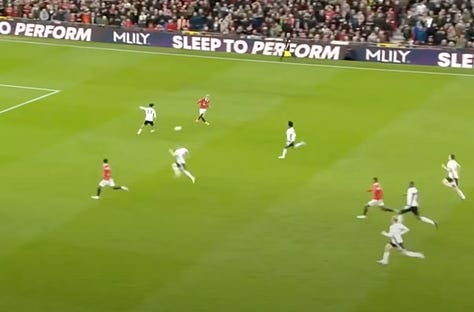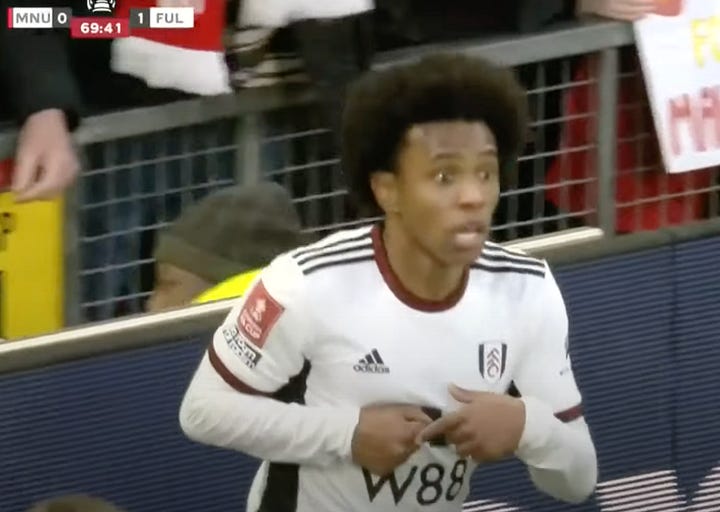Players See Only What They Want to See
Who are the only stakeholders in the game tasked with being objective?
The ugly scenes seen on Sunday during the FA Cup quarter final between Manchester United and Fulham demonstrate a truism in the biased world of players, coaches and fans. They see only what they want to see.
In the 70’, Manchester United counterattacked and Jadon Sancho had a shot cleared off the goal line by Willian (Willian Borges da Silva). Sancho saw that it was a handball off the line but referee Chris Kavanaugh, who to his credit made a fantastic sprint to put himself in a great position inside the penalty area to see the incident, thought otherwise and signalled for a corner kick.









Willian, to his discredit, gestured that the ball had struck him on the chest and/or on his fist which he claimed was close to his body.
PICS 11-12


You can see from the replays that the ball does hit Willian’s hand. The question to ask is whether this is a deliberate handball that has denied an obvious goal-scoring opportunity (DOGSO).
Next, VAR (Neil Swarbrick) intervened. Swarbrick believed this was a deliberate handball and therefore is a case of a clear and obvious error that needs to be corrected before the game restarts. This is precisely why VAR was “invented and implemented” this century for The Beautiful Game (most notably because of Thierry Henry’s double handball dark arts when playing for France against Ireland in 2009).
Now, if Willian’s hand had been close to his chest, the rising ball would most likely have been deflected into the goal. But we know this did not happen, so the hand could not have been passive or limp against Willian’s chest. What actually happened is that Willian had expected a hard shot on goal and had clenched his hand in anticipation of being hit. He then makes a forward movement with his arm and clenched fist, which pushes the rising ball downwards and away from goal. The change in trajectory of the ball alone will tell you that a strong arm was deliberately used to push the ball (ie, hand to ball) down and away from goal.
So, VAR called Kavanagh to check the pitchside monitor and Fulham manager Marco Silva chose that moment to leave his technical area to abuse the referee. Kavanagh correctly sent off Silva. VAR had corrected an injustice and next Willian was sent off for DOGSO by hand.
It was when Kavanagh showed Willian a red card that Mitrovic decided to continue challenging the referee for what, in his biased view, were unfavourable decisions against his team. Mitrovic pushed Kavanagh, who then did not hesitate to send off the Fulham forward for violent conduct. Even worse, Mitrovic continued to confront Kavanagh by getting into the referee’s personal space and almost headbutting him. This action is the most serious of the match and has led to calls of at least a ten-match ban, on top of the three matches that are mandatory for violent conduct.
Another example of challenging the referee
In the 68’, Jadon Sancho delivered a right-foot curling shot at the edge of the penalty area. It deflected off his own teammate Marcus Rashford for a goal kick, but Sancho was “certain” it had been deflected by a Fulham player positioned behind his teammate.


What’s laughable is that the ball deflects off Rashford for a goal kick and he immediately claims it is a corner ball.
This dark art of always claiming “our ball” is another reason why there is disrespect in the game. There is a culture of cheating and of deceiving the referee because players know the benefit of getting an incorrect but favourable decision far outweighs the (lack of any) penalties involved in “lying through your teeth” to the referee. It is similar to diving, where the benefit (of winning a penalty and/or getting an opponent sent off) outweighs the consequences of getting a yellow card.
What do you do when both teams always claim it is “our ball”?
It is at times like these when we appreciate why referees were “invented and implemented” in the first place over a century ago. Referees were introduced to be the neutral arbiters on the field of play. Whatever happened, the final decision would always rest with the referee and teams were always taught to accept the referee’s decision and get on with the game. Unfortunately, this no longer applies in the super competitive and highly commercialised modern world of football (note: this is a subject matter for future articles).
These days, what happens more often than not is for players, coaches and even fans to always challenge the referee for decisions that go against their team. This dark arts behaviour also filters down to all levels of the game, where we are now even seeing U10 players challenging junior referees.
Chris Kavanagh’s brave and strong showing towards the disrespect shown to him by Fulham manager Marco Silva and Fulham forward Mitrovic deserves applause, respect and full support from the football authorities. However, it remains to be seen whether this strong showing will have any impact on the future behaviour of players, coaches and fans when they do not agree with a referee’s decision.
In former premiership referee Mark Halsey’s words: “The FA have a duty of care to referees and we cannot have this at any level of football. They have to set an example by sanctioning Mitrovic heavily and I would expect both clubs to be charged with failing to control their players.”
Q: Who are the only stakeholders in the game tasked with being objective?
A: Remember, the only stakeholders tasked with being objective are the match officials. And for trying their best, they are being taken to task by the rest of the game’s stakeholders.
References
Manchester United 3 - 1 Fulham (BBC)
Man United 3-1 Fulham | FA Cup 22/23 Match Highlights (beIN Sports Asia)
Manchester United v Fulham | Key Moments (Emirates FA Cup)
2009 Republic of Ireland v France football matches
Aleksandar Mitrovic should be hit with a TEN-GAME ban for pushing Chris Kavanagh (Daily Mail)




